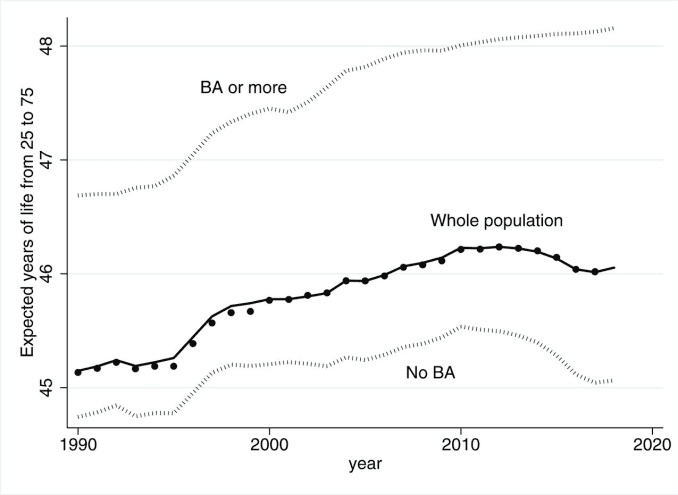
But according to a recent study, published in the Proceedings of the National Academy of Sciences, life expectancy for the two-thirds of Americans without a college degree is declining — creating a growing gap in life expectancy between those with and those without a secondary education.
“When you look at the data, you see life expectancy rising until 2012, and then it starts going down for people without a BA.,” says Sir Angus Deaton, professor of economics at USC and Princeton University and one of the study’s co-authors. “The decrease in life expectancy is happening not to everybody, but to Americans who do not have a four-year college degree. There is a huge educational divide.”

For the study, Deaton and co-author and fellow Princeton professor Anne Case analyzed 48.9 million death certificate records spanning from 1990 to 2018 to calculate how many years a given 25-year-old could expect to live up until the age of 75. This methodology was used to account for the likelihood of a person dying of non-age-related issues such as “deaths of despair:” a term often used to describe rising deaths due to the opioid epidemic, alcohol and suicide.
The researchers found that in 2018, American adults with a bachelor’s degree could expect to live 48.2 years out of a possible 50, while those without a college degree could expect to live 45.1 years.
Deaton and Case stress that this discrepancy is significant, and is in part caused by disparities in economic opportunity and a lack of well-paying and stable jobs for those without a bachelor’s.
“America is the richest large country in the world, with frontier medical technology, yet we still see large declines for Americans without a four-year degree, even prior to the arrival of Covid-19,” said Case in a statement.
Deaton says the pandemic has worsened conditions for workers without a college degree, who are more likely to work in-person and are more likely to face unsafe working conditions.
“Good jobs have become increasingly rare for workers without a college diploma, many of whom have lost their jobs to globalization and automation and for whom the cost of employer-provided health care has increasingly priced them out of the high-quality labor market,” explains Deaton. “There has been a real loss of the pillars of working-class life, and it has contributed to this decline in adult life expectancy.”
He adds that high health-care costs have led to an increase in gig workers who are less likely to have health insurance or stable work, amounting to “a very slow rolling destruction of a way of life for less-educated Americans over the past 50 or 60 years.”
And while systemic inequality has created race-based disparities in life expectancy, the new study indicates that education level is playing an increasingly significant role in how long Americans can expect to live.
“Throughout all of recorded history in the U.S., Black people have more frequently died earlier and younger than whites — that remains true,” says Deaton. “But what has happened is the gaps by race have narrowed and the gaps by education have widened within both groups. Differences by race, which have been there forever, are still there, but they’re becoming smaller than differences in education.”
The researchers suggest that increasing opportunities in education and the labor market could help address some of the concerns raised in their paper.
“Everybody who wants to go to college should go to college. And one of the things standing in the way of that is this huge escalation in the fees for going to college. That’s a real issue and it would be good to do something about it,” says Deaton. “But we don’t think everybody wants to go to college or everybody needs to go to college. What we need is a system in which we find good jobs again for people who haven’t gone to college as well.”
Source: CNBC


